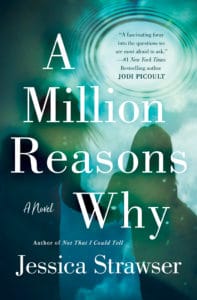

Enjoy both women’s fiction and suspense? Jessica Strawser is the accomplished author of four novels that deftly combine both. Her most recent, A Million Reasons Why, explores the aftermath of a DNA test that links two strangers, upending both their lives. For one, the knowledge of a half-sister could be a prayer answered. For the other, this knowledge threatens to shatter fundamental beliefs about herself and her family. A Million Reasons Why asks critical questions about the meaning of family, forgiveness, and our obligations to others. Along the way, the plot keeps you turning the pages, with several twists I had no idea were coming.
A Million Reasons Why was named to Most Anticipated lists from She Reads, ENews!, Frolic, and Bookish, and others.
Here, Strawser, who’s also editor-at-large at Writer’s Digest, answers a few questions about writing flawed and nuanced characters, covering hefty medical issues within a novel, and her thoughts on DNA testing.
How did your nonfiction writing help prepare you for writing fiction?
Before this year, I might have given a more general answer about how the two are different beasts that do share some crossover in the required skill sets. But A Million Reasons Why in particular has been my most research-intensive book: Without my background in journalism, I may have been too intimidated by the subject matter to ever attempt a story like this one. (In fact, I nearly still was too intimidated: I wrote this essay on Career Authors about how I came to grips with the novel’s very real life-or-death subject matter.)
Conversely, what one or two things surprised you when you began writing fiction, whether about the process of writing fiction itself, or the path to publishing?
Fiction is far more subjective. This means a couple key things: One, that it’s harder to find a benchmark of how you’re actually doing unless you get up the guts to show your work to not just one reader, but quite a few of them. And two, that you can’t be overly swayed by any one piece of feedback (positive or negative). I was with my second literary agent before I ever sold my debut novel, Almost Missed You. The very same manuscript the first agent had deemed unworthy of submitting ended up selling in a very good pre-empt deal, with multiple big publishers interested. And plenty of writers have stories much like that one.
One thing the struck me about the characters in A Million Reasons Why was how they’re flawed and complicated, but also truly trying to do what’s right. Can you talk about writing characters that are so wonderfully nuanced?
I try to see all characters as flawed and complicated: I think there’s less black-and-white in the world than many people assume. Maybe that’s why I like to tell my stories from multiple characters’ points of view: It helps illuminate those nuances. A Million Reasons Why alternates chapters and perspectives between the two half sisters, and certainly if we’d gotten only one side of that story, it would have been a very different book.
A Million Reasons Why goes into some detail about Sela’s kidney failure. Can you briefly discuss how you approach researching a technical topic like this?
I’m fortunate to have a close friend who works as a renal dietitian, so I knew a bit about how important her work was and what she helped her patients face every day. Before I began writing the story, I read just about everything on the subject I could get my hands on, and she was a wonderful sounding board to make sure my premise was viable and well-considered. From there, I attended a seminar on kidney donation—which had panels of donors and recipients present, as well as medical staff—interviewed a donor at length about her experience, listened to a Strangers podcast series on altruistic donation, and so on. Of course, this is by no means a procedural medical story, but I wanted the story to be true to the characters’ emotional experience with the subject matter, and of course to be factually plausible, even with some creative license taken.
Finally, have you taken a DNA test? Can you briefly share why/why not and if you’ve uncovered any secrets?
I have not taken a DNA test myself. I think one thing I’ve learned is that these tests can be invaluable for families, but they shouldn’t be taken lightly, as there can be unintended outcomes. With that in mind, frankly I just haven’t yet had a strong enough reason to take one.